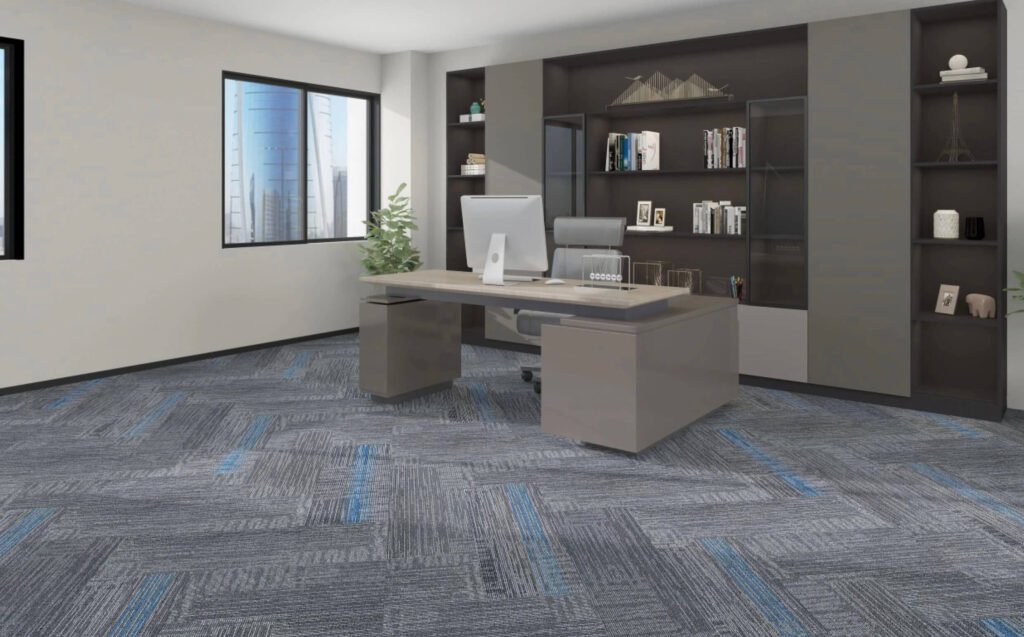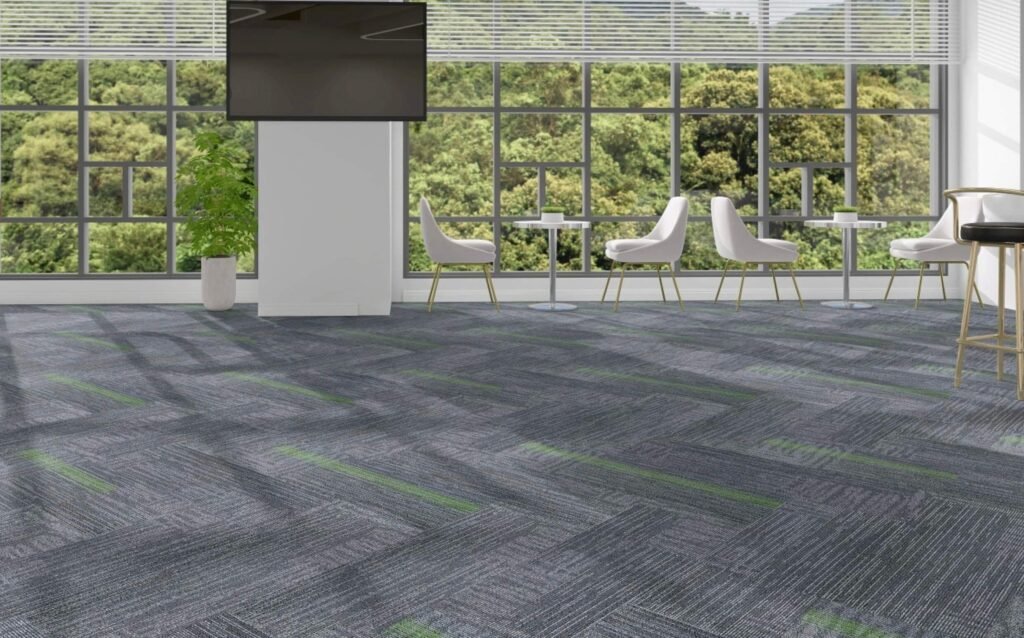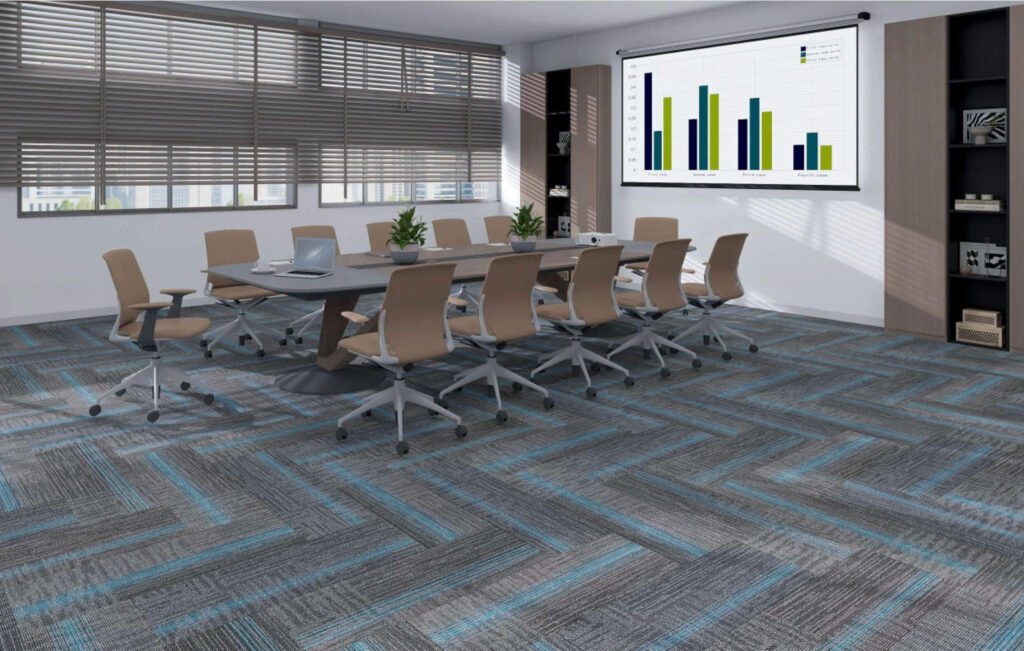Table of Contents
Selecting the right commercial carpet tile is a critical decision for businesses looking to enhance aesthetics, functionality, and durability in their workspaces. Unlike traditional broadloom carpets, modular carpet tiles offer flexibility, cost-effectiveness, and ease of maintenance, making them an ideal choice for high-traffic areas such as offices, hotels, and retail spaces.
In this comprehensive guide, we’ll walk you through everything you need to consider when choosing commercial carpet tiles, from material selection to installation and sustainability. Whether you're renovating an existing space or designing a new one, this guide will ensure you make an informed decision.

1. Understanding Commercial Carpet Tiles
What Are Commercial Carpet Tiles?
Commercial carpet tiles, also known as modular carpets, are square or rectangular sections of carpeting that can be arranged in various configurations. They are designed for easy installation, replacement, and maintenance, making them a practical flooring solution for commercial spaces.
Benefits Over Broadloom Carpets
- Easy Installation and Replacement – Carpet tiles can be installed with minimal disruption and individual tiles can be replaced if damaged, reducing maintenance costs.
- Design Flexibility – Available in various patterns, textures, and colors, carpet tiles allow for creative and customizable layouts.
- Waste Reduction – Unlike broadloom carpets, modular tiles minimize material waste during installation, making them an eco-friendly choice.
- Improved Durability – Many carpet tiles are designed for high foot traffic, ensuring longevity and wear resistance.

2. Factors to Consider When Choosing Commercial Carpet Tiles
Aesthetic Appeal & Design
The design of your commercial carpet tiles should complement your brand and space. Consider:
- Color and Pattern – Choose colors and patterns that align with your brand identity and enhance the ambiance of your space.
- Layout Possibilities – Modular carpet tiles can be arranged in creative patterns such as checkerboard, herringbone, or monolithic designs to add visual interest.
Material & Fiber Types
The fiber type determines the carpet tile’s durability, softness, and resistance to stains. Common materials include:
- Nylon – Highly durable, stain-resistant, and ideal for high-traffic areas.
- Polyester – Softer and more affordable but may wear out faster in busy spaces.
- Polypropylene (Olefin) – Moisture-resistant but less durable under heavy use.
- Eco-Friendly Fibers – Options made from recycled materials are available for businesses prioritizing sustainability.
Pile Type & Construction
- Loop Pile – Highly durable, ideal for offices and commercial areas with heavy foot traffic.
- Cut Pile – Offers a plush feel but may show footprints and wear over time.
- Cut and Loop Pile – Combines durability with texture, adding design versatility.
Backing Options
- Hardback – Provides structural stability and cost-effectiveness but less cushioning.
- Cushion Back – Enhances comfort and sound absorption, reducing noise in busy workspaces.
Durability & Wear Rating
Carpet tiles are rated based on their ability to withstand wear and tear. Ensure your selection matches your space’s traffic levels:
- Low-Traffic Areas – Reception lounges, private offices.
- Medium-Traffic Areas – Conference rooms, open workspaces.
- High-Traffic Areas – Hallways, lobbies, and retail stores.

3. Practical Considerations for Business Owners
Ease of Installation & Replacement
- Peel-and-Stick Backing – Simplifies installation without adhesives.
- Interlocking Tiles – Snap together easily and can be removed individually if needed.
- Professional Installation vs. DIY – Weigh the cost and expertise required for your space’s needs.
Maintenance & Cleaning Requirements
- Routine Care – Regular vacuuming prevents dirt buildup.
- Deep Cleaning – Hot water extraction or steam cleaning prolongs tile lifespan.
- Stain Prevention – Choosing stain-resistant materials helps maintain long-term appearance.
Cost & Budget Planning
- Initial Investment vs. Long-Term Value – High-quality carpet tiles may have a higher upfront cost but result in long-term savings due to durability and ease of replacement.
- Bulk Purchasing Discounts – Many suppliers offer discounts for large orders, reducing overall costs.

4. Sustainability & Eco-Friendly Options
Recycled & Low-VOC Carpet Tiles
- Many manufacturers offer carpet tiles made from recycled materials, reducing environmental impact.
- Low VOC (Volatile Organic Compound) emissions contribute to better indoor air quality and a healthier work environment.
Certifications & Industry Standards
- LEED Certification – Carpet tiles contributing to LEED credits help businesses achieve sustainability goals.
- CRI Green Label Plus – Indicates low VOC emissions for improved air quality.
5. Choosing the Right Supplier & Manufacturer
Reputation & Quality Assurance
- Research Reviews & Case Studies – Look for testimonials from other businesses in your industry.
- Request Samples – Evaluate texture, color accuracy, and durability before purchasing.
Warranty & After-Sales Support
- Check Warranty Terms – A strong warranty ensures the manufacturer stands behind their product.
- Customer Support – Reliable after-sales service helps with maintenance guidance and issue resolution.

Conclusion & Final Tips
Choosing the right commercial carpet tile involves careful consideration of design, durability, installation, maintenance, and environmental impact. By assessing these factors and selecting a reputable supplier, businesses can invest in a flooring solution that enhances their space and supports long-term performance.
To make the best choice, request samples, consult with flooring experts, and prioritize materials suited to your specific business needs. With the right carpet tiles, you can create a stylish, functional, and sustainable commercial environment.

